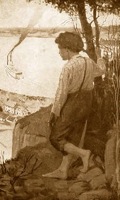Difference between revisions of "Nostalgia"
(Created page with 'File:lighterstill.jpgright|frame ==Etymology== New Latin, from Greek nostos return home + New Latin -algia; akin to Greek neisthai to retu...') |
m (Text replacement - "http://nordan.daynal.org" to "https://nordan.daynal.org") |
||
| Line 2: | Line 2: | ||
==Etymology== | ==Etymology== | ||
| − | New [[Latin]], from [[Greek]] nostos return [[home]] + New Latin -algia; akin to Greek neisthai to return, [ | + | New [[Latin]], from [[Greek]] nostos return [[home]] + New Latin -algia; akin to Greek neisthai to return, [https://nordan.daynal.org/wiki/index.php?title=English#ca._600-1100.09THE_OLD_ENGLISH.2C_OR_ANGLO-SAXON_PERIOD Old English] genesan to survive, [[Sanskrit]] nasate he approaches |
*Date: [http://en.wikipedia.org/wiki/18th_Century 1729] | *Date: [http://en.wikipedia.org/wiki/18th_Century 1729] | ||
==Definitions== | ==Definitions== | ||
Revision as of 22:27, 12 December 2020
Etymology
New Latin, from Greek nostos return home + New Latin -algia; akin to Greek neisthai to return, Old English genesan to survive, Sanskrit nasate he approaches
- Date: 1729
Definitions
- 1 : the state of being homesick : homesickness
- 2 : a wistful or excessively sentimental yearning for return to or of some past period or irrecoverable condition; also : something that evokes nostalgia
Description
The term nostalgia describes a yearning for the past, often in idealized form.[1] The word is a learned formation of a Greek compound, consisting of νόστος, nóstos, "returning home", a Homeric word, and ἄλγος, álgos, "pain" or "ache". It was described as a medical condition, a form of melancholy, in the Early Modern period, and came to be an important topic in Romanticism.[1]
In common, less clinical usage, nostalgia sometimes includes a general interest in past eras and their personalities and events, especially the "good old days" of a few generations back recast in an idyllic light, such as the Belle Époque, Merry England, Neo-Victorian aesthetics, the US "Antebellum" Old South, etc. Sometimes it is brought on by a sudden image, or remembrance of something from one's childhood.
